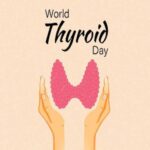Stress and unhealthy lifestyle found to be major contributing factors
New Delhi, May 9, 2017: According to a recent study by Georgia Tech University, an average person’s memory declines by as much as 40% between the age of 30 and 65. This is even more pronounced in the “golden years”. Many studies show that a person starts experiencing significant memory loss each year starting at the age of 30. This, coupled with loss of brain function, can pose a lot of problems for an individual.
Young people are increasingly complaining of forgetfulness and memory lapses. Be it not remembering names, faces, important dates, appointments, and conversations or forgetting where important things have been kept, stopping mid-sentence, and experiencing brain fog, the warning signs of declining memory and brain function are many. What was once associated with old-age is now gripping the younger generation as well.
Speaking about this, Padma Shri Awardee Dr K K Aggarwal, National President Indian Medical Association (IMA) and President Heart Care Foundation of India (HCFI) and Dr R N Tandon – Honorary Secretary General IMA in a joint statement, said, “Decline in memory and brain function in the younger generation is definitely alarming and can be attributed to many factors including multitasking; stress and technologically driven environment; toxins in air, food, and water; and an unhealthy diet and lifestyle. When our body is under stress, there is an increase in the release of free radicals (chemicals that weaken the immune system, exposing the body to degenerative diseases). This in turn can cause hormonal imbalances, alter eating behaviour, and affect overall productivity and well-being. Under such conditions, our body needs more memory boosting nutrients like Vitamin B, Vitamin C, folic acid, zinc, and magnesium.”
There are several other factors that can impact memory and brain function such as consuming adulterated food, excessive sugar in food, increased alcohol consumption, prolonged exposure to electromagnetic radiations, etc. The right diet and lifestyle changes can go a long way in managing memory loss at a young age.
“The way we live, eat and drink, and treat our body affects the memory as well as your physical health and wellbeing. There is a need to rethink our schedules and shift to a lifestyle that is more inclusive of healthy eating habits, regular exercise, and a stress-free schedule,” adds Dr Aggarwal.
Here are some things you can try on a daily basis to boost your memory naturally.
Manage stress: Pressures related to deadlines or stress in personal life can affect your ability to focus and recall. Extreme anxiety can lead to memory impairment. Try managing daily stress through deep breathing, meditation, yoga, and a “mindful” approach to living.
Sleep well: A good night’s sleep is proven to boost memory and brain power. It helps in consolidating memories. If you suffer from sleep issues, it is a good idea to try and improve your sleep habits first and turn to medication only if nothing helps.
Quit smoking: Smokers have a greater degree of age-related memory loss and other memory problems. It has been found that people who smoke have a greater risk of developing dementia in the old age. So, it is better to kick the butt sooner.
Drink moderately: Alcohol consumption can increase the risk for memory loss and dementia. Alcoholic people find it more difficult to perform tasks such as memorizing lists. Another type of memory loss associated with alcohol use is called Korsakoff’s syndrome where long-term vitamin B1 deficiency combined with the toxic effects of alcohol on the brain can trigger sudden and dramatic amnesia.







Heya i am for the first time here. I found this board and I in finding It really useful & it helped me out a lot. I am hoping to present something back and help others such as you helped me.
http://www.corburterilio.com/
I like the efforts you have put in this, regards for all the great blog posts.
http://www.borvestinkral.com/
What’s Happening i am new to this, I stumbled upon this I’ve found It positively useful and it has aided me out loads. I hope to contribute & aid other users like its aided me. Great job.
http://www.borvestinkral.com/